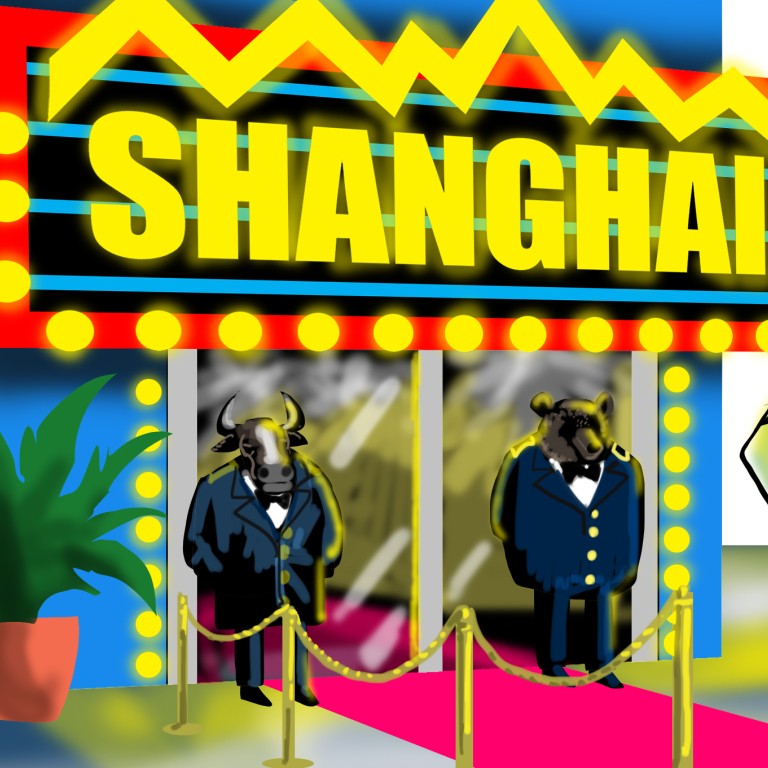
Regulators must get to grips with China’s stock-market manipulators, but are they up to the job?
Robert Boxwell says the series of missteps amid volatility in China’s markets shows up the scale of the problem

READ MORE: CSRC chief Liu Shiyu faces uphill battle to reform China’s stock markets
In January, Xiao summed up China’s stock market problems: an “immature bourse and participants, incomplete trading rules, an inadequate market system and an inappropriate regulatory system”. That pretty much covered things, except the real causes of the market rout: overvalued stocks, an overleveraged, slowing economy with excess capacity and little hope for consumer spending to take up the slack. January’s massive issuance of new bank debt would seem to indicate that Beijing is less optimistic than it’s saying about consumption replacing investment in our lifetime.

Xiao’s last straw was the spectacular failure of his signature solution to stop the market meltdowns that began last summer: circuit breakers. Circuit breakers have been around since 1988, when the Brady Commission recommended them as a means to temporarily halt relentless selling by institutions so buyers had time to gather and come back into the markets. I spent that spring in a class taught by a senior staff member of the commission, which identified the causes of the October 1987 “Black Monday” crash and fixed them.
The start of the decline “ignited mechanical, price-insensitive selling by a number of institutions employing portfolio insurance strategies and a small number of mutual fund groups reacting to redemptions. The selling by these investors, and the prospect of further selling by them, encouraged a number of aggressive trading-oriented institutions to sell in anticipation of further market declines... This selling, in turn, stimulated further reactive selling by portfolio insurers and mutual funds,” it found.
READ MORE: China’s market regulator cannot be a player, too

A regulator’s job isn’t to keep markets up, though. It’s to keep them clean and functioning properly
Which is exactly what happened on January 7, the second and final day of the circuit breaker’s short life. The ticker was in relentless free fall, wiping out billions in market valuation in just 14 minutes of trading.
A regulator’s job isn’t to keep markets up, though. It’s to keep them clean and functioning properly. Liu may have a way to go there. Two of Xiao’s former senior colleagues at the regulatory body were detained last year for “serious violation of party discipline”, along with at least seven senior executives at Citic Securities for insider trading. Cracking down on insider trading was one of the supposed centrepieces of Xiao’s regulatory stint.
The first thing Liu should do is look into the market manipulations that have popped up since the arrival of the so-called “national team” of state-owned financial institutions tasked to prop up the market, and figure out who exactly is selling to them. Because it’s hard to imagine that Beijing would tolerate, for example, a trading strategy that lets people buy low in the morning knowing they can sell high to the national team in the afternoon.
READ MORE: What to expect from China’s new chief securities regulator?

If it turns out that members of the national team are selling to one another, say, exchanging losses on one counter for gains on another, it may be the first market where the regulators are heading to jail and the manipulators are the heroes. Liu should tell them to stop, which they should be happy to do, if that’s the case, since it’s a charade and, smart as they are, they understand the impossible task of performing such financial isometrics forever. Perhaps it gave them something to do on what otherwise might have been slow trading days. It was reported last summer that the national team pledged not to sell shares until the Shanghai Composite index returns to 4,500. That could take a while.
READ MORE: Mainland China stocks post worst February in 15 years as yuan tumbles
As for the recent flurry of attempts at better communication, this should not mean talking to the markets more; it means telling the truth when you talk. The recent redaction of foreign exchange data isn’t a propitious sign in that regard. Since the announcement of China’s new public relations efforts, we’ve seen all sorts of characters rolling out a message, most of them well-groomed with proper podium presence. As cheerleaders, whose overall message can be summed up as, “things aren’t really as bad as they look”, they like to pooh-pooh the stock market meltdown by claiming it’s not linked to China’s real economy.

READ MORE: Why China should just let the stock market crash
Sure. Try telling that to the millions of retail investors who borrowed heavily to get into the game thinking it was supported by the government. The market’s value wasn’t 30 per cent last June. It was 60 per cent and rising on the back of China’s propaganda machine’s stock market circus barkers. More than US$4 trillion of Chinese savers’ wealth has evaporated since then.
If what Cui said is how Beijing looks at China’s stock markets, what’s the point of having them? Stock markets with Chinese characteristics aren’t real stock markets. At the moment, China’s are little more than a mainland Macau. Deng Xiaoping (鄧小平) said the mainland could try stock markets and if they didn’t work, it could close them. That might be an option worth considering if they can’t figure out how to regulate them properly.
Robert Boxwell is director of the consultancy Opera Advisors

